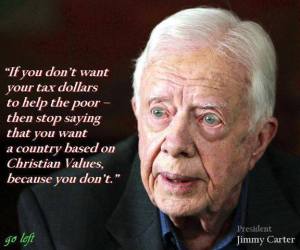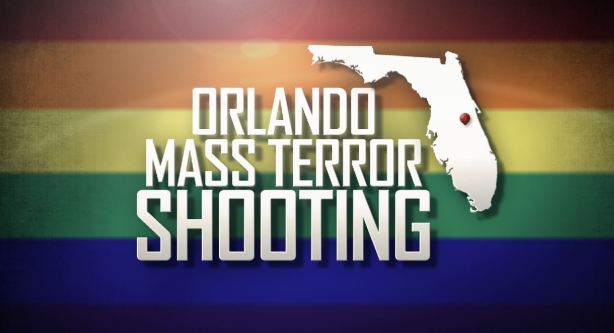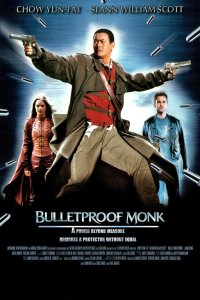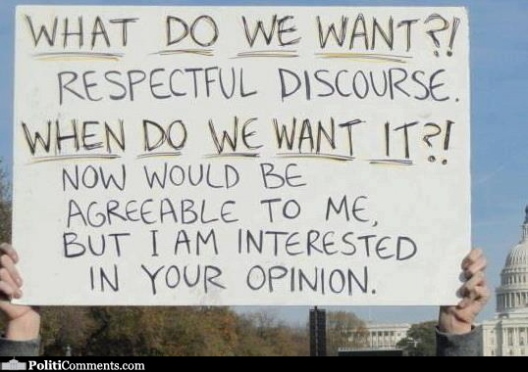Hello all, its me again. I rarely use this blog, (although make sure to read my other posts if you like) but it is a good publishable place to air my thoughts, and if you care, respectfully discuss issues.
Respectfully discuss. I have to make an apology. I posted a fun little meme the other day on Facebook which lit up many of my friends and relatives. When it got hot, I got huffy and got on my soapbox trying to clarify and defend my view, but Facebook is not a great medium for that. I prefer the blog form for this kind of discussion. So if I hurt your feelings or scared you by how rabid and liberal I sounded, I do apologize. I don’t want to be harsh, but I do have something to say.
Here’s what I meant when I posted…
The earliest followers of Jesus were derided and made fun of. (They were also lit on fire and fed to lions, but that is another topic.) One of the derisive monikers these early followers of “The Way” were given, was “Christian.” (Literally, “little Christ”) This was supposed to be an insult, because Jesus was a discredited and executed political rabble-rouser, and to associate with someone so discredited would bring dishonor on you and your household. But the name stuck. And the reason why the name stuck is that the followers of Jesus persistently and even joyfully went out and did the things that Jesus Christ did, hence the name, “little Christs.” Some fun evidence of this is found in the book of Acts, where the early church and its ethos are recorded for the interested reader. These people sold all their goods, and redistributed them among each other, so no one was in need. They made a special ministry (the first diaconal ministry, for all you deacons out there) to care for widows and orphans, two groups that were forgotten by, and marginalized by the culture of the time. (For more on Acts, see “The Bible”) So Christians, for all intents and purposes, were the first social safety net. Not for citizens of the Roman empire, but for the lowly who did not qualify, or who were cast out of that society for any number of reasons.
Ok, so that’s what Christians are, or at least where they got the name from right? Cut and dried. But wait a minute, twenty centuries have gone by, and we still have Christians – are they still doing these things? Yes. Yes, they are. In my neighborhood there is a Children’s home for orphans, founded by a Lutheran minister that took this Christian thing seriously. There are numerous places, both churches and para- church organizations, that see a ministry to the poor as at least part of their mission to the world: caring for people who need it, feeding the hungry, etc. Good enough right? This is a least part of the church’s job, and I probably won’t get too much argument about that.
So that settles it. The church’s job is to feed the poor, and that’s that. We don’t need the government for that, and that is not what government is for. I would love to be able to agree, but I can’t for at least two good reasons.
#1 The church is broke.
Okay, not broke, but reeling from the past 50 years of declining membership, tepid giving, expensive personnel, and REALLY expensive real estate. We cannot afford to be our society’s safety net anymore. This was maybe different in say, the middle ages, when the church and the state were so closely conflated that they were practically the same entity. Then not only was it the Church’s job to do the “Christian things” but it was also the default mode of the state to provide for the welfare of citizens.(I apologize if this is a poor one sentence summation of several centuries of European history.) The system was not always (or even hardly ever) adequate, and people still lived short and brutish lives if they were poor, but there was no argument about what the state’s responsibility was, and where they ultimately got their power from. Again depending on the location and the nation, this got done better or worse from century to century. Usually worse.
So not a perfect system, but at least the church was better funded, and had a lot of political clout. Not always used well, but a lot of money and clout.
21st century, neither of these things are true. And like my cousin pointed out “The poor you will always have with you.” (One of my pet peeves is how much this particular verse is mis-quoted, but I will not go into that now.) So what do we do with these darn poor people?
Somewhere around the Great Depression, our society decided that it was the “civilized thing” to help people who were the victims of circumstance. Lots of programs were born from this “New Deal” and it was hotly contested, just like any public assistance program is today, but eventually we decided, as a society, that it was not in our best interests to leave the poor dangle in the wind of fate. You might have seen the continuing effects of the “New Deal” if you have ever collected social security, participated in Medicare, got a student loan, received a tax exemption for having children, or bought a gallon of gas – activities which are all subsidized by the government in an ever widening web of economic props, many of which can be traced back to “New-dealism” –the idea that states, in my words, that “capitalism is good, but that when people lose the game, they should still have the right to participate in society and not just die. “
If you argue that this is not the Government’s job, you are not alone. I concede that this is a valid political opinion.This counter-argument has followed social liberalism its entire life. In fact, i will admit that fiscal conservatism has a lot to commend it. It reduces the tax burden, presumably stimulating the economy with more available dollars; it trims government and puts the financial responsibility for public assistance (if any) more on states and local governments who can more easily discern for themselves what an appropriate public safety net is; and finally, Fiscal Conservatism is mindful of not passing on huge deficits to the next generation. These are good things- really! Except for the small fact that…
#2. We are a Christian Nation
We love to say this. We love to wave our flags, and sing religious songs. There is an American Flag in my Church’s sanctuary, and I bet there is one in yours too. On the 4th of July, we pray and we sing. On 9/11 we pray and we sing. Our Nation has a long, complex, and interesting relationship with the Christian Religion that cannot be overlooked. Despite the fact that we have Constitutional protections against the establishment of a state religion, (The very First Amendment ,in fact) the Christian Ethos still infuses every level of Government. You might want it more so, or you might want it less so, but it is there. Sometimes it makes me a little bit nervous. History does not bear too many times when a cozy relationship between religion and state ended well. But that is the rhetoric out there. There is a strong contingency of American people who believe in this “Christian Nation” concept, and take it seriously. Make of it what you will.
So now refer back to my previous discussion on the term “Christian.” The name did not originally mean that you went to a certain church on Sunday, or that you bought into a certain religious/political ideology. The term was originally coined because the people did the things that Jesus did. Now open your Bibles and read the Gospels again. See Jesus. Listen to Jesus. Now look at our government and our culture.
And ask yourself this question:
“If being a Christian means doing the things that Jesus did, because you believe that Jesus is the Son of God, come to save you from you sin and teach you the way to live, can we really, with a straight face, call ourselves a nation based on Christian values?”
Its fine if the answer is no. In fact, I don’t really believe we are supposed to be a Christian Nation. (1st Amendment again.) We could be a “Nation of Christians” and that would be awesome. A “Nation of Christians” could get things done. But a “Christian Nation” is a fantasy. It is an unconstitutional idea that is being sold to us by a few very sharp ideologues, who know how to manipulate our emotions for political gain. I prefer my religious freedoms. I prefer to practice my religion as I see fit, and not have it interpreted to me by a particular political stance.
So here we are. Fiscal Conservatism is a valid political view. And if you don’t want your tax dollars spent on the poor, by all means, make yourself heard in the polls. If you are also a Christian, that’s great too. May the Spirit of Christ impel you to greater compassion in your personal walk, and give you the grace to be light and hope to the world. Be a leader in your church and follow Jesus in holiness and peace. But please do not conflate these two views into anything like the phrase “Christian Nation.” Because I don’t think that means what you think it means. That is really all I was trying to say with the Jimmy Carter meme. This glib phrase from Jimmy highlights the absurdity of the phrase “Christian Nation.” I don’t think it can exist, and even if it could, I don’t think it should exist, mostly because if it did, it probably would not reflect my particular brand of Christianity. And I do not like people telling me what it means to be a Christian any better than you do. But please let me share with you how my faith shapes my life and my own actions.
My faith informs my political views. (Not the other way around!)This is hard, because as I have said a number of times, there is no ticket for that. Even though I sometimes look to the future and wish that I could, I personally do not hold with Republican Fiscal Conservatism, but on the other hand I do like their stance on abortion. But not on war. Or the death penalty. I like Socially liberal tenets of The Democratic Party, but I think Abortion should be illegal. I took a poll, and I’m not just a 3rd party voter, I’m like a 5th party voter. So my vote won’t really count, ever. If you think I’m full of crap, you can at least take comfort in that. (Actually it might surprise you that I’m still a registered Republican. It surprises me too sometimes, especially with “The Donald” show lighting up the polls. God save us.)
But I personally feel that as a society we have a responsibility to the poor, in our communities, our country and in the world. I do not think it’s as easy as saying “they should get a job” or that they are lazy. Poverty is a complex and nuanced issue that cannot be dismissed with a sound bite. I know that because I try to apply my faith on the ground to feed people in my own community day to day. Not only that, I try also to be an advocate, speaking to the larger structures that keep people in poverty, and speak God’s truth to those systems that are unjust. They are there, and they are not going away. That is the whole package- not just a band-aid, but a plan to make this a better world for everyone. I will not succeed in this life. I will keep trying anyway.
My Christian Faith informs my own personal actions, and as I participate in democracy, I will be voting for leaders who will reflect my values as someone who follows Jesus and tries to do the things he did. That is the only way in which “a nation based on Christian values” makes any sense to me. If Christian people, who have Christian values, elect leaders that enact policy that does the things that Jesus did, then we are closer to that moniker. But religious conservatism and Republican conservatism, in the unholy alliance that has existed in its current state since the Oral Roberts “Moral Majority” days, is often at odds with what I see when I read the Gospel account of Jesus and his works, and see in the New Testament the community of faith that was inspired by Jesus and motivated by his Spirit. Religious leftism, as my friend Cliff pointed out, also makes a new fundamentalism that defines what it means to be a Christian by the things you do, which is at odds with the core of the Gospel as I understand it as a Lutheran. And although I am left leaning, I am deeply skeptical when the label “Christian” is applied to many of the ideas that come from either of these conflations between politics and religion. Because our faith should inform our politics, not the other way around.
There ARE lazy people in the world. Some of them are on assistance. That is a shame, and a waste. But I administrate a local food-bank, and I can tell you that of those folks that are on assistance and come through the line once a month to get help, the percentage that I personally feel are trying to play the system is surprisingly low. I know that because I have taken the time to get to know these people: I talk with them, pray with them and hear about why they are on the rocks, and have spent a lot of time thinking about what might make a difference in their lives.
There are a lot more widows, whom social security does not even cover the cost of their medicine. There are folks who got hurt on the job and waited for 6-12 weeks for disability insurance to kick in, going from living paycheck to paycheck to being 3 months behind. There are people who never had the opportunity to get out of a situation of generational poverty because they were never taught how, could never in a million years afford school, and who live in a rural area with no jobs and nowhere really to go. And yes, sometimes there are people who made mistakes, trusted the wrong people, maybe went to prison, and now have nothing with which to start their life back up again.
I personally cannot look Jesus in the face, and then turn and tell them they all had their chance, and they got what they deserved. They know that already. They, like all of us, need grace. Do I get taken advantage of? Of course. But my conscience is clear. God will judge. As a Christian, I read verses like Matthew 25:37-40; James 2:14-17; and 1 John 3:17-18 (Among many others) and I let the ethos of Christ inform my actions and my political views, not the other way around. If you have found a better way through life, please tell me, and I will listen to you in all earnestness.
But above all, because I work directly with the poor, I have learned that these people are all people. Human Beings. God’s Children. Deserving of Love, a second chance, a leg up.
I am angered by those who try to play the system, because their abuse is all many people see, either in my little food-bank, or in state-run assistance programs. And I get very angry, because there is a great and legitimate need. The church cannot fill the need, even though we valiantly try. Even the state cannot fill the need, because we will never really have the political will for comprehensive change of the many systems that keep people in poverty. We need to be a Nation of Christians, because only the power and compassion of Christ can make us a whole and healed people again. That is the glimpse of the coming Kingdom of God that I have gotten from the work I do. It gives me hope for God’s future: the time that is still coming, when the Spirit of God will make all things new.
But until that time, we cannot tire of doing the right things. And if we vote to have our state or national government chip in, it will make the job just a little easier for those of us on the ground.



